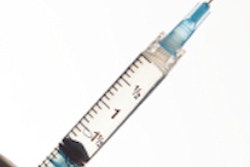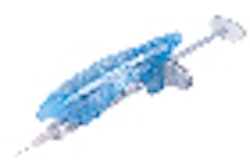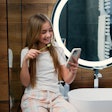
Getting children to sit through a dental procedure is a challenge most practitioners inevitably face. The mere mention of the word "needle" can prompt anxiety and panic in young patients, making a routine dental procedure anything but.
Now researchers at the University of Uberaba in Brazil say they have come up with a simple solution to the problem: the Angelus Alligator disposable syringe cover. They presented the device and some accompanying clinical data on its effectiveness during a poster session at the recent International Association for Dental Research (IADR) meeting in San Diego.
“It is easy to use, safe, and does not interfere with the correct application of anesthetic techniques.”
— Maria Angélica Hueb de Menezes
Oliveira, DDS
With the Angelus Alligator, the only thing a child will see prior to receiving local anesthesia is a cartoon-looking device made of flexible rubber that fits over the needle and syringe, hiding them from young patients' eyes, according to Maria Angélica Hueb de Menezes Oliveira, DDS, a professor in the department of pediatric dentistry at the university's dental school.
"Our experience with children who were undergoing treatment at the Children's Clinic School of Dentistry revealed that the patients were more cooperative due to less stress and fear, as they did not even realize that they were having an injection, she told DrBicuspid.com. "So the patient-professional relationship was more harmonious during the appointment."
Dr. Hueb came up with the idea during a conversation with her brother Fernando, who is also at dentist and a professor at the University of Uberaba. Hiding the needle from children who were about to undergo local anesthesia was always difficult and often unsuccessful; parents complained about the stress their children experienced during that phase of treatment.
"We created the device design with the help of a technical consultant at the university named Carlos Roberto Bonfim," Dr. Hueb said. "Then, after some technical studies, the prototype was developed. We received project support from the Center for Technological Innovation at the university."
 Boys' and girls' versions of the Angelus Alligator device are undergoing regulatory approval for international sale. Image courtesy of Dr. Maria Angélica Hueb de Menezes Oliveira.
Boys' and girls' versions of the Angelus Alligator device are undergoing regulatory approval for international sale. Image courtesy of Dr. Maria Angélica Hueb de Menezes Oliveira.With the university's help, Dr. Hueb and her team have applied for an international patent, she said. Regulatory approval process from Brazil's National Health Surveillance Agency (ANVISA) is already under way.
Angelus Dental Products, an international dental device manufacturer based in Brazil that will make the product, has already obtained International Standardization Organization (ISO) approval and European conformity certification.
"The product will be sold in the next year," Dr. Hueb said. "Angelus has expanded its commercial operations and exports to more than 60 countries. In Brazil you will find the product in dental supply stores, and in other countries the product will reach stores via distributors designated by the company."
The price has yet to be determined, she added.
Dr. Hueb and her team are confident in the new disposable device's potential to take the fear out of local anesthesia injections for pediatric patients.
"The Angelus Alligator has been tested by dentists, especially pediatric dentists, and they realized that it is easy to use, safe, and does not interfere with the correct application of anesthetic techniques," she said.



















